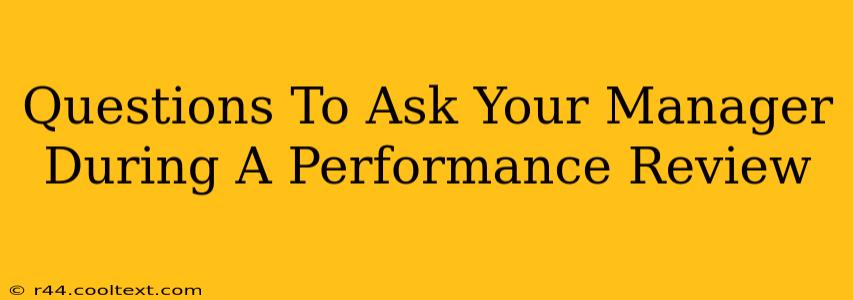Your performance review is more than just a time for your manager to assess your work; it's a valuable opportunity for you to reflect on your achievements, identify areas for improvement, and plan for your future within the company. Asking the right questions can significantly impact the effectiveness of the meeting and your career trajectory. Don't just sit passively – actively participate!
Before the Meeting: Preparation is Key
Before your review, take some time for self-reflection. Consider your accomplishments, challenges, and areas where you'd like to grow. This self-assessment will help you formulate insightful questions. Review your previous performance reviews and any feedback you've received throughout the year. This will provide context for your questions and demonstrate your proactive approach.
Powerful Questions to Ask Your Manager
Here are some key questions categorized to help you structure your inquiry:
About Your Performance and Achievements
- What are my top three strengths, based on your observations? This question helps you understand your manager's perspective on your strongest skills, allowing you to leverage them further.
- What are one or two areas where I could improve, and how can I work on them? This is crucial for identifying areas needing development and getting specific guidance.
- Can you provide specific examples of my work that exceeded expectations? Understanding what you did well and why is vital for replicating success.
- Are there any projects or tasks where I could have performed better, and what could I have done differently? Constructive criticism is essential for growth. Focus on learning from past experiences.
- How does my performance align with the team's and company's overall goals? Understanding the bigger picture connects your individual contributions to the organization's success.
About Your Career Development and Future
- What opportunities are available for professional development within the company? Shows your commitment to growth and learning.
- What are the next steps in my career progression, based on my current performance? This clarifies your path and expectations.
- What skills or experience do I need to develop to advance to the next level? Provides a roadmap for future development.
- What are the company's plans for my role in the next 6-12 months? Understanding future expectations helps you prepare and contribute effectively.
- What kind of support can the company provide to help me reach my career goals? Demonstrates your initiative and desire for advancement.
About Feedback and Communication
- How effectively do you feel I communicate with you and the team? Open communication is vital for success.
- Is there anything I could do to improve my communication skills? Specific feedback helps address any weaknesses.
- How can I best keep you updated on my progress on ongoing projects? Ensures alignment and minimizes misunderstandings.
- How frequently would you like to check in with me on my progress? Establishes a clear communication rhythm.
After the Meeting: Actionable Steps
After your performance review, take time to reflect on the feedback received. Document key takeaways and create an action plan to address areas for improvement. Schedule a follow-up meeting to discuss your progress and ask any further questions.
By asking thoughtful and proactive questions during your performance review, you demonstrate initiative, a commitment to growth, and a desire to contribute to the company's success. This proactive approach will help you achieve your career goals and build a strong working relationship with your manager. Remember to actively listen to your manager's feedback and engage in a two-way conversation. This makes the review a valuable tool for your professional development.

